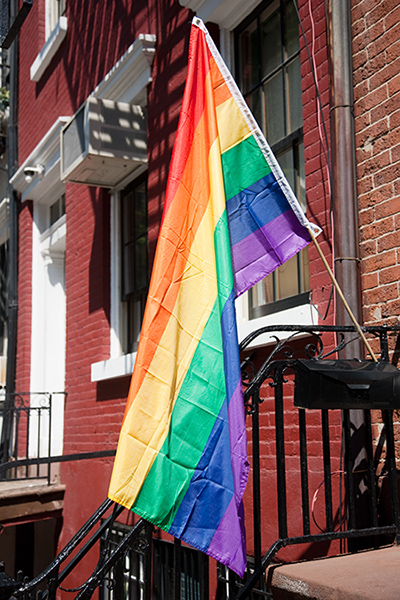Meet Til Kus, President of DUCOM's LGBTQ Professionals in Medicine (PM)

June 29, 2020
By Bernadette Campoli, Interim Program Director, Office of Diversity, Equity and Inclusion, and Lisa Ryan, Web Content Writer, Department of Marketing and Communications
As we celebrate PRIDE Month, we took the opportunity to sit down with current LGBTQ-PM president Til Kus to learn more about them and the organization.
Can you tell me a bit about yourself?
My name is Til. I use they/them pronouns. I’m trans, nonbinary, and queer. I grew up in a small town in rural, central Maine, so I really like doing all things outdoors. I live in Boston with my cat.
What would you like to accomplish as President of LGBTQ-PM?
I think one of the most important goals I have for the club is to have it be a safe, supportive space for queer and trans students on campus. I think oftentimes being in the medical field as a person with queer or trans or other LGBTQ identity can be really difficult. Medicine does tend to be fairly conservative with these things, so working in health care can be a struggle for a lot of people. That’s why I want to make sure that there's that safe, supportive space for students, to make sure they reach their best potential, feel healthy while they go through school, and be empowered to advocate for their communities in medicine.
Another thing that we'd like to look at is advocating for curricular changes at Drexel. I think we're looking especially to get questions about taking gender history incorporated into the curriculum. That includes making sure during our clinical interviews we're asking people's gender identity and also their sex assigned at birth, which is really important clinically in terms of health outcomes. I also think that overall staff and student training is important to advocate for as a club. For instance, covering how to include gendered language in certain lectures and topics and how to address students with or without gendered language, that sort of thing. So, a variety of topics.
Then we always do our annual symposium, that's usually in January, at the beginning of the second semester, and we host a series of speakers that will come to talk about different subjects in queer and trans health. We're thinking of having the topic be more trans adolescent health this year. So that's something we're working on getting together now, which is exciting.
We also do a variety of other, smaller events throughout the year, such as Trans Day of Remembrance in November and Diversity Day in the spring. There’s also usually a series of social events, too – just get-togethers within the group, but then we’ll also have a student mixer with other medical schools’ LGBTQ clubs. That’s always fun.
Finally, I think I'd like to incorporate some more community volunteerism, like with Health Outreach Project (HOP) or something like that. I want to help engage students and the community to go volunteer with the LGBTQ community.
How do you feel about the recently passed law barring workplace discrimination against members of the LGBTQ+ community?
It’s great, obviously legal protections are incredibly important. I think what’s good about this, in addition to the straightforward benefit of it, is that it sets a precedent for future legal interpretations of the phrase ‘sex discrimination.’ Hopefully going forward, other laws that prohibit sex discrimination will also be interpreted to include gender and sexual orientation. In this way, this initial ruling could have a greater reach than just employment law.
I will say that in many ways, this is very symbolic in the sense that it’s still very possible to fire employees for being trans and queer [under the guise of firing them for something else]. But it does reflect the direction we should be going in socially and culturally, and hopefully individual employers will begin changing their views due to this ruling.
You mentioned the importance of cultural humility in health care. How do you think that helps make medicine better for everyone involved?
I think specifically the trans community, it's an identity that's interestingly intertwined with medicine. Medicine has a huge gatekeeping role in trans people's wellbeing and ability to exist in their own identities, so that’s a dynamic I think medicine needs to be very aware of. Obviously, this gatekeeping position can be very harmful for a lot of people, so I think physicians need to be aware of their role in someone's identity actualization and how important that is.
The trans community specifically has a lot of health disparities because of poor treatment in medicine. For example, they're at greater risk for some cancers due to lack of engagement in preventive care, as a result of a variety of things, like not being treated well by health care providers, discrimination, being denied care, or being uncomfortable with how physicians refer to their body parts.
In addition, trans people have huge rates of suicidality and mental health problems, which also stems from discrimination inside and outside of health care, and that’s something physicians can address in their own practices.
I both personally and professionally understand the importance of feeling comfortable going to the doctor, of not being afraid, as someone who has experienced discrimination seeking health care. When many trans people think about accessing health care, even for something not related to gender-affirming care, it’s often a question of what’s worse: having to see a doctor or waiting out whatever’s happening to them. At the very least, we want the lesser of the two evils to be going to the doctor, which often is not the case for trans people.
Back to Top